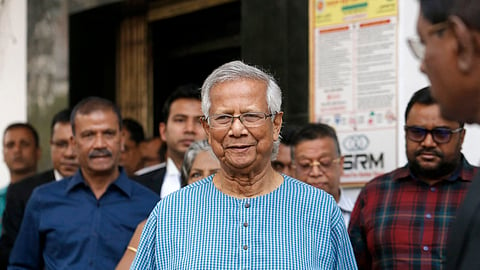

Nobel-winning microfinance pioneer Muhammad Yunus has agreed to spearhead the interim government in Bangladesh after mass protests forced long-time Prime Minister Sheikh Hasina to flee the country.
"I am honoured by the trust of the protesters who wish for me to lead the interim government," he said in a written statement to AFP.
"If action is needed in Bangladesh, for my country and for the courage of my people, then I will take it," he said, also calling for "free elections."
This comes after key organisers of the Bangladeshi protest urged the 84-year-old to helm an interim government after President Mohammed Shahabuddin dissolved the parliament on Tuesday.
"We have decided that the interim government would be formed in which internationally renowned Nobel Laureate Dr Muhammad Yunus, who has wide acceptability, would be the chief adviser," Nahid Islam, the main leader of Students Against Discrimination (SAD), said in a video message.
Yunus is a respected economist and has been credited with lifting millions out of poverty with his pioneering microfinance bank, but he earned the enmity of Hasina, who accused him of "sucking blood" from the poor.
Known as the "banker to the poorest of the poor," Yunus was awarded the Peace Prize in 2006 for his work loaning small cash sums to rural women, allowing them to invest in farm tools or business equipment and boost their earnings.
Grameen Bank, the microfinance lender he founded, was lauded for helping unleash breakneck economic growth in Bangladesh, and its work has since been copied by scores of developing countries.
"Human beings are not born to suffer the misery of hunger and poverty," Yunus said during his Nobel lecture, daring his audience to imagine a world where deprivation was confined to history museums.
But his public profile in Bangladesh earned him the hostility of Hasina, who once accused him of "sucking blood" from the poor.
Before her hurried resignation and departure from Bangladesh on Monday, Hasina's 15-year tenure was characterised by a growing intolerance of dissent, and Yunus's popularity marked him as a potential rival.
In 2007, Yunus announced plans to set up his own "Citizen Power" party to end Bangladesh's confrontational political culture, which has been punctuated by instability and periods of military rule. He abandoned those ambitions within months, but the enmity aroused by his challenge to the ruling elite has persisted.
Yunus was hit with more than 100 criminal cases and a smear campaign by a state-led Islamic agency that accused him of promoting homosexuality.
The government unceremoniously forced him out of Grameen Bank in 2011—a decision fought by Yunus but upheld by Bangladesh's top court.
In January, he and three colleagues from one of the companies he founded were sentenced to jail terms of six months—but immediately bailed pending appeal—by a Dhaka labour court, which found they had illegally failed to create a workers' welfare fund.
All four had denied the charges,Student leaders whose protest campaign culminated in Hasina's ouster on Monday were expected to meet with the military to demand Yunus lead a caretaker government.
'Poverty was all around me'
Yunus was born into a well-to-do family—his father was a successful goldsmith—in the coastal city of Chittagong in 1940.
He credits his mother, who offered help to anyone in need who knocked on their door, as his biggest influence.
Yunus won a Fulbright scholarship to study in the United States and returned soon after Bangladesh won its independence from Pakistan in a brutal 1971 war.
When he returned, he was chosen to head Chittagong University's economics department, but the young country was struggling through a severe famine, and he felt compelled to take practical action.
"Poverty was all around me, and I could not turn away from it," he said in 2006.
"I found it difficult to teach elegant theories of economics in the university classroom... I wanted to do something immediate to help people around me."
After years of experimenting with ways to provide credit for people too poor to qualify for traditional bank loans, he founded Grameen Bank in 1983.
The institution now has more than nine million clients on its books, according to its most recent annual report (2020), and more than 97 percent of its borrowers are women.
Yunus has won numerous high honours for his life's work, including a US Presidential Medal of Freedom awarded by Barack Obama.